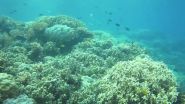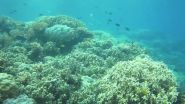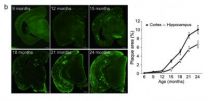(Press-News.org) VIDEO:
Scientists collected fish from the coral reefs shown here and found that fish from the more acidic waters of the bubble reefs were less likely to detect the odor of...
Click here for more information.
Fish living on coral reefs where carbon dioxide seeps from the ocean floor were less able to detect predator odor than fish from normal coral reefs, according to a new study.
The study confirms laboratory experiments showing that the behavior of reef fishes can be seriously affected by increased carbon dioxide concentrations in the ocean. The new study is the first to analyze the sensory impairment of fish from CO2 seeps, where pH is similar to what climate models forecast for surface waters by the turn of the century.
"These results verify our laboratory findings," said Danielle Dixson, an assistant professor in the School of Biology at the Georgia Institute of Technology in Atlanta. "There's no difference between the fish treated with CO2 in the lab in tests for chemical senses versus the fish we caught and tested from the CO2 reef."
The research was published in the April 13 Advance Online Publication of the journal Nature Climate Change. Philip Munday, from James Cook University in Australia, was the study's lead author. The work was supported by the Australian Institute for Marine Science, a Grant for Research and Exploration by the National Geographic Society, and the ARC Centre of Excellence for Coral Reef Studies.
The pH of normal ocean surface water is around 8.14. The new study examined fish from so-called bubble reefs at a natural CO2 seep in Papua New Guinea, where the pH is 7.8 on average. With today's greenhouse gas emissions, climate models forecast pH 7.8 for ocean surface waters by 2100, according to the Intergovernmental Panel on Climate Change (IPCC).
"We were able to test long-term realistic effects in this environment," Dixson said. "One problem with ocean acidification research is that it's all laboratory based, or you're testing something that's going to happen in a 100 years with fish that are from the present day, which is not actually accurate."
Previous research had led to speculation that ocean acidification might not harm fish if they could buffer their tissues in acidified water by changing their bicarbonate levels. Munday and Dixson were the first to show that fishes' sensory systems are impaired under ocean acidification conditions in the laboratory.
"They can smell but they can't distinguish between chemical cues," Dixson said.
Carbon dioxide released into the atmosphere is absorbed into ocean waters, where it dissolves and lowers the pH of the water. Acidic waters affect fish behavior by disrupting a specific receptor in the nervous system, called GABAA, which is present in most marine organisms with a nervous system. When GABAA stops working, neurons stop firing properly.
Coral reef habitat studies have found that CO2-induced behavioral changes, similar to those observed in the new study, increase mortality from predation by more than fivefold in newly settled fish.
Fish can smell a fish that eats another fish and will avoid water containing the scent. In Dixson's laboratory experiments, control fish given the choice between swimming in normal water or water spiked with the smell of a predator will choose the normal water. But fish raised in water acidified with carbon dioxide will choose to spend time in the predator-scented water.
Juvenile fish living at the carbon dioxide seep and brought onto a boat for behavior testing had nearly the identical predator sensing impairment as juvenile fish reared at similar CO2 levels in the lab, the new study found.
The fish from the bubble reef were also bolder. In one experiment, the team measured how far the fish roamed from a shelter and then created a disturbance to send the fish back to the shelter. Fish from the CO2 seep emerged from the shelter at least six times sooner than the control fish after the disturbance.
Despite the dramatic effects of high CO2 on fish behaviors, relatively few differences in species richness, species composition and relative abundances of fish were found between the CO2 seep and the control reef.
"The fish are metabolically the same between the control reef and the CO2 reef," Dixson said. "At this point, we have only seen effects on their behavior."
The researchers did find that the number of large predatory fishes was lower at the CO2 seep compared to the control reef, which could offset the increased risk of mortality due to the fishes' abnormal behavior, the researchers said.
In future work, the research team will test if fish could adapt or acclimate to acidic waters. They will first determine if the fish born at the bubble reef are the ones living there as adults, or if baby fish from the control reef are swimming to the bubble reef.
"Whether or not this sensory effect is happening generationally is something that we don't know," Dixson said.
The results do show that what Dixson and colleagues found in the lab matches with what is seen in the field.
"It's a step in the right direction in terms of answering ocean acidification problems." Dixson said. "The alternative is just to wait 100 years. At least now we might prepare for what might be happening."
INFORMATION:
This research is supported by the Australian Institute for Marine Science, a Grant for Research and Exploration by the National Geographic Society, and the ARC Centre of Excellence for Coral Reef Studies. Any conclusions or opinions are those of the authors and do not necessarily represent the official views of the sponsoring agencies.
Fish from acidic ocean waters less able to smell predators
Oddly behaving fish from a CO2 seep confirm laboratory experiments
2014-04-13
ELSE PRESS RELEASES FROM THIS DATE:
Hereditary trauma
2014-04-13
The phenomenon has long been known in psychology: traumatic experiences can induce behavioural disorders that are passed down from one generation to the next. It is only recently that scientists have begun to understand the physiological processes underlying hereditary trauma. "There are diseases such as bipolar disorder, that run in families but can't be traced back to a particular gene", explains Isabelle Mansuy, professor at ETH Zurich and the University of Zurich. With her research group at the Brain Research Institute of the University of Zurich, she has been studying ...
Glasses strong as steel: A fast way to find the best
2014-04-13
Scientists at Yale University have devised a dramatically faster way of identifying and characterizing complex alloys known as bulk metallic glasses (BMGs), a versatile type of pliable glass that's stronger than steel.
Using traditional methods, it usually takes a full day to identify a single metal alloy appropriate for making BMGs. The new method allows researchers to screen about 3,000 alloys per day and simultaneously ascertain certain properties, such as melting temperature and malleability.
"Instead of fishing with a single hook, we're throwing a big net," said ...
Virus-fighting genes linked to mutations in cancer
2014-04-13
Researchers have found a major piece of genetic evidence that confirms the role of a group of virus-fighting genes in cancer development.
Our understanding of the biological processes that cause cancer is limited. UV light and smoking are two well-understood cancer-causing processes. Exposure to either of these processes causes distinguishable patterns of genetic damage, or 'signatures', on the genome that can lead to cancer. All cancer-causing processes leave their own distinct imprint or signature, on the genomes of cancer cells.
The APOBEC family of genes control ...
Tiny particles could help verify goods
2014-04-13
CAMBRIDGE, MA -- Some 2 to 5 percent of all international trade involves counterfeit goods, according to a 2013 United Nations report. These illicit products — which include electronics, automotive and aircraft parts, pharmaceuticals, and food — can pose safety risks and cost governments and private companies hundreds of billions of dollars annually.
Many strategies have been developed to try to label legitimate products and prevent illegal trade — but these tags are often too easy to fake, are unreliable, or cost too much to implement, according to MIT researchers who ...
New mouse model could revolutionize research in Alzheimer's disease
2014-04-13
Alzheimer's disease, the primary cause of dementia in the elderly, imposes a tremendous social and economic burden on modern society. In Japan, the burden of the disease in 2050 is estimated to be a half a trillion US dollars, a figure equivalent to the government's annual revenues.
Unfortunately, it has proven very difficult to develop drugs capable of ameliorating the disease. After a tremendous burst of progress in the 1990s, the pace of discoveries has slowed. Dr. Saido believes that part of the difficulty is the inadequacy of current mouse models to replicate the ...
New technique takes cues from astronomy and ophthalmology to sharpen microscope images
2014-04-13
The complexity of biology can befuddle even the most sophisticated light microscopes. Biological samples bend light in unpredictable ways, returning difficult-to-interpret information to the microscope and distorting the resulting image. New imaging technology developed at the Howard Hughes Medical Institute's Janelia Farm Research Campus rapidly corrects for these distortions and sharpens high-resolution images over large volumes of tissue.
The approach, a form of adaptive optics, works in tissues that do not scatter light, making it well suited to imaging the transparent ...
Finding the switch: Researchers create roadmap for gene expression
2014-04-13
In a new study, researchers from North Carolina State University, UNC-Chapel Hill and other institutions have taken the first steps toward creating a roadmap that may help scientists narrow down the genetic cause of numerous diseases. Their work also sheds new light on how heredity and environment can affect gene expression.
Pinpointing the genetic causes of common diseases is not easy, as multiple genes may be involved with a disease. Moreover, disease-causing variants in DNA often do not act directly, but by activating nearby genes. To add to the complexity, genetic ...
Hop into Easter with Bunny Costumes from iLoveSexy
2014-04-13
With Easter less than two weeks away there is no time to waste. It's time to gather up all the candy, paint all the eggs, and perhaps find a festive bunny costume to wear for fun. At iLoveSexy, an online retailer for women's lingerie and costume, there is wide selection of costumes from popular brands like Leg Avenue, Roma Costume, Be Wicked, and more. Finding that bunny costume won't be a problem, and although they do not provide the conventional onesie type bunny outfit, the alternatives certainly do not disappoint.
There can be many different approaches to a bunny ...
Global Storm Adds Restaurant Table App to its Line of Restaurant Software Tools
2014-04-13
Global Storm is excited to announce an addition to its lineup of restaurant software tools, the Global Storm Table App! Global Storm has created a line of grocery, retail and restaurant apps to ease business stress, streamline communication, provide customer outreach and more. Global Storm is excited to add this new app to our line of products, which will help attract and maintain restaurant patrons.
The Table App is a relatively simple app that is mounted to the tables of a restaurant. While this app was built for iPads, it also works great and saves space and money ...
Hillsborough County SBIC Provides Business Plan Development Workshop April 12, Winner Receives $1,000 Grant from University Area CDC
2014-04-13
The Small Business Information Center (SBIC) of Hillsborough County is hosting its complimentary, two-part Developing a Business Plan workshop at the University Area Community Center on Saturday, April 12 from 9 a.m. until 1:30 p.m. Attendees not only learn everything involved in developing a business plan, but also have the chance to receive a $1,000 grant to launch their entrepreneurial dream.
After the workshop, attendees are encouraged to develop their complete business plan and submit it by May 1 to be eligible for the $1,000 grant provided by the University Area ...
LAST 30 PRESS RELEASES:
Scientists show how to predict world’s deadly scorpion hotspots
ASU researchers to lead AAAS panel on water insecurity in the United States
ASU professor Anne Stone to present at AAAS Conference in Phoenix on ancient origins of modern disease
Proposals for exploring viruses and skin as the next experimental quantum frontiers share US$30,000 science award
ASU researchers showcase scalable tech solutions for older adults living alone with cognitive decline at AAAS 2026
Scientists identify smooth regional trends in fruit fly survival strategies
Antipathy toward snakes? Your parents likely talked you into that at an early age
Sylvester Cancer Tip Sheet for Feb. 2026
Online exposure to medical misinformation concentrated among older adults
Telehealth improves access to genetic services for adult survivors of childhood cancers
Outdated mortality benchmarks risk missing early signs of famine and delay recognizing mass starvation
Newly discovered bacterium converts carbon dioxide into chemicals using electricity
Flipping and reversing mini-proteins could improve disease treatment
Scientists reveal major hidden source of atmospheric nitrogen pollution in fragile lake basin
Biochar emerges as a powerful tool for soil carbon neutrality and climate mitigation
Tiny cell messengers show big promise for safer protein and gene delivery
AMS releases statement regarding the decision to rescind EPA’s 2009 Endangerment Finding
Parents’ alcohol and drug use influences their children’s consumption, research shows
Modular assembly of chiral nitrogen-bridged rings achieved by palladium-catalyzed diastereoselective and enantioselective cascade cyclization reactions
Promoting civic engagement
AMS Science Preview: Hurricane slowdown, school snow days
Deforestation in the Amazon raises the surface temperature by 3 °C during the dry season
Model more accurately maps the impact of frost on corn crops
How did humans develop sharp vision? Lab-grown retinas show likely answer
Sour grapes? Taste, experience of sour foods depends on individual consumer
At AAAS, professor Krystal Tsosie argues the future of science must be Indigenous-led
From the lab to the living room: Decoding Parkinson’s patients movements in the real world
Research advances in porous materials, as highlighted in the 2025 Nobel Prize in Chemistry
Sally C. Morton, executive vice president of ASU Knowledge Enterprise, presents a bold and practical framework for moving research from discovery to real-world impact
Biochemical parameters in patients with diabetic nephropathy versus individuals with diabetes alone, non-diabetic nephropathy, and healthy controls
[Press-News.org] Fish from acidic ocean waters less able to smell predatorsOddly behaving fish from a CO2 seep confirm laboratory experiments





